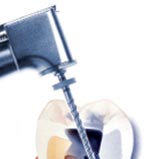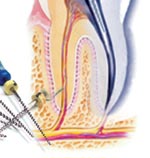 |
|
Root canal treatment
Endodontics
Bangkok Thailand




language |
l | THAI |
|
|
What does an endodontist do?
How do the root canals become infected?
How will I know if I need a root canal?
Will my tooth be restored with a crown or a filling?
What if the pulp becomes infected again?
Will I be in any pain after treatment?
Will my diet be affected after treatment?
Will I be able to brush my teeth?
Will there be any discoloration?
Will there be any follow-up appointments?
Our endodontist is a dentist who
is trained to diagnose and treat problems located inside of the tooth with special
endodontic equipment. As
specialists they focus solely on endodontic procedures. Endodontics, or Root Canal, is the prevention,
diagnosis and treatment of disorders of the dental pulp. The pulp is made up of nerves, blood vessels,
and connective tissue, which are important in tooth development.
There are very small canals within your tooth and they can become infected quite easily.
This causes the pulp inside your tooth to become infected as well. Either
your dentist or an endodontist will remove the infection by performing a
root canal procedure. This is one of the safest and most effective
methods of saving a damaged tooth.
There are a variety of causes: deep decay, repeated dental procedures, or a crack or chip in the tooth. An injury to a tooth may also cause pulp damage, even in cases where the tooth has no visible external damage. One the most common causes for this infection is an untreated cavity. Another reason is when the pulp inside the tooth becomes inflamed from trauma or extensive restorative work which is why dentists are wary of applying a series of fillings to one tooth, in a short period of time.
Symptoms include pain, prolonged sensitivity to heat or cold, tenderness felt when chewing, discoloration, swelling of the gum, drainage and tenderness in the lymph nodes as well as nearby bone and gingival tissues. It is possible, however, that there will be no symptoms at all.
Teeth which have undergone root canal therapy will need to
be restored to full function. Restoration is important as
endodontically treated teeth are susceptible to fracture,
and any fracture could lead to a permanent loss of the tooth.
Restorations usually involve a composite filling or a full
crown, depending on the strength of the remaining tooth.
Anterior teeth usually maintain most of their structure and
can be restored with a composite filling. However, if a
large part of the tooth is missing, then a crown is
required.
If the tooth does not have enough of its original structure
to support the crown then a post will be cemented. This will
extend into one or more of the canals. The post will not
extend the length of the canals so they will remain sealed.
The tooth will now be sealed, and restored to full function.
A non-vital tooth is more brittle than a vital one and is
more liable to fracture so, in most cases, it is recommended
that your root canal tooth be crowned (capped) following
treatment.
Posterior teeth are not often restored with composite
fillings because they are more exposed. They are usually
restored with full crowns, covering and supporting the
entire tooth, as well as maintaining the occlusion.
There are two types of root canal procedures in common use. The first type of procedure is a standard root canal procedure as described above. The other is practiced when a root canal procedure is required on a tooth for the second time. The two procedures are the same, other than that your dentist must remove all of the previous filling in the canal and pulp area in order to start again. This will require more time and expense.
You may experience some discomfort on the tooth that has been treated. Swelling may
also occur and it is not uncommon for the pain to last up to as many as ten
days. If you are experiencing discomfort, avoid strenuous activities and
keep your head elevated at all times.
For pain, ibuprofen is recommended. However, you should always follow your
doctors instructions concerning medication(s). If the prescribed medication
is not effective in relieving the pain, please contact the office.
To minimize swelling, use an ice pack application on the face, over the operated area.
The pack should be applied for 20 minute periods, with 10 minutes intervals,
for the first day only. On the second day, rinse your mouth with a warm salt
water solution, as often as possible. Continue this rinsing for one week.
The solution can be made by adding one teaspoon of salt to 8oz of water.
Please avoid eating or drinking anything hot. Your mouth will still be numb and you may not feel the heat and burn your mouth. Eat foods that do not require vigorous chewing during the first few days. Eggs, soups and milk shakes would be suitable.
A tooth that has undergone a root canal should be maintained in the same as any other tooth. Remember to clean your teeth at least once a day, preferably with fluoride toothpaste. Mouthwash is recommended. Rinsing the mouth with warm salt water three to four times a day may also be helpful in relieving discomfort.
Discoloration - you may notice that your treated tooth has changed color slightly. Your dentist can advise you on a range of tooth whitening procedures if the tooth is not restored with a crown.
There will be at least two follow-up appointments. The first follow-up will be after a few
days and you will have your sutures removed. The second appointment will be
after a few weeks, during which we will evaluate how well the tooth has
healed. In some cases, additional follow-up appointments may be necessary.
We usually like to perform a follow-up exam at least six months after the treatment.
This enables us to evaluate the long term outcome of the treatment, be sure
that the tooth is fully functional, and determine the extent of bone
healing. There is no charge for this visit.
| Page 1 l 2 l 3 l 4 |
|
HOME
l SERVICE
l DENTISTS
l TECHNOLOGY
l FACILITIES
l ABOUT US
l SITE MAP
PROMOTION
l PRICE&DURATION
l CONSULTATION
l FAQ
l LINKS
l MAP
l TESTIMONIALS
l OUR LAB
l RESOURCES
DENTAL BRACES
l LASER TEETH WHITENING
l IMPLANT DENTISTRY
l ENDODONTICS
l OPERATIVE DENTISTRY
l SEDATION DENTISTRY
COSMETIC DENTISTRY
l PROSTHODONTICS
l PERIODONTICS
l ORAL SURGERY
l PAEDODONTICS
l GP & ORAL EXAM
l OCCLUSION
DENTAL OFFICE
l DENTAL CLINIC
l COSMETIC DENTISTRY
l COSMETIC DENTIST
l TEETH BLEACHING
l TOOTH WHITENING
DENTAL CROWNS
l DENTAL IMPLANTS
l DENTAL TREATMENT
l DENTAL IMPLANT
............................................................................................................................. Copyright© 2004 SILOM DENTAL BUILDING. All Rights Reserved.
Local Call : 0 2636 9092-5, International Call : (+) 66 2636 9091, (+) 66 2636 9097
e-mail :silomdental@silomdental.com
Endodontics Treatment, Endodontics Treatment Bangkok, Endodontics Treatment Thailand, Root Canal Treatment Bangkok Dental Thailand